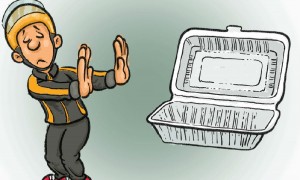25 Years AI Lab Zurich: Switzerland’s First Robotic Child!
In celebration of the 25th anniversary of the Artificial Intelligence Laboratory Zurich, the University of Zurich presents “Robots on Tour”: World Congress & Exhibition of Robots, Humanoids, Cyborgs and more. It took place on 8th (only for schools) and 9th (public exhibition with approx. 4,000 visitors) March 2013 in Zurich, Switzerland. Over 40 robots from all over the world such as AFFETTO, iCub, Armar, PR-2 and Cornell Ranger will be presented to the broad audience. World-class speakers such as Rodney Brooks attended and as an additional highlight, the AI Lab unveiled its new robot Roboy: Switzerland’s first robotic child!
If robots are going to be part of our everyday lives, they’ll need to fit into our homes rather than the factory floor. Few people would be comfortable living with a metal spider on tank treads, so the University of Zurich’s Artificial Intelligence Laboratory (AI Lab) has built this robot toddler called “Roboy.” Using “soft robotics ” technology that mimics the human body, the 1.2 meter (3 ft, 11 in) tall humanoid robot is part of an effort to make robots that people are more comfortable with in day-to-day situations.
Roboy doesn’t look very endearing at the moment. In fact, it looks more like a cyborg skeleton than a charming child, but it’s still a work in progress. The laboratory’s goal is to build Roboy in only nine months. Work began June 2012 with 15 project partners and over 40 engineers and scientists. These parties are providing expertise and funds through sponsorship and crowdfunding that includes auctioning space on the robot for logos, and hiring it out for business functions when completed.
Built out of plastic, Roboy is modeled on the human musculoskeletal system, but this mimicry goes beyond the aesthetic. Instead of motors in its joints, Roboy uses motor assemblies that pull elastic cables, so the system operates in a way similar to muscles and tendons. AI Lab claims that this will allow Roboy to move “almost as elegantly as a human.”
The purpose of Roboy is to push for the acceptance of service robots by making people more comfortable having them around all the time. With an aging population, AI Lab believes that such service robots will be increasingly important in helping the elderly to continue independent lives.
Roboy is currently getting a new face chosen by a Facebook contest, and can move its arms. Later, the robot will be covered with a soft skin. Roboy has made its first public appearance at the “Robots on Tour” exhibition on March 9, to celebrate AI Lab’s 25th anniversary, and next it aims to make more people to accept and like it.
|
目前,Facebook上在进行一项征集活动,为“机器小子”设计一副新脸庞。另外,“极其小子”还可以转动胳膊了。不久的将来,它将拥有自己的皮肤。在三月九日的“机器人之旅”展会上,“;机器小子”首次对公众亮相,以庆祝苏黎世人工智能实验室成立25周年,它的下一步目标是让更多人接受它和喜欢它。
在苏黎世人工智能实验室成立25周年庆典上,苏黎世大学举办了一场名为“机器人之旅”的展会。这是一次展示世界范围内机器人、类人机器人以及半机器人等人工智能产品的盛会。这次大型展会于2013年3月在瑞士首都苏黎世举办,并作为第八届学生专场和第九届公众场吸引了大约四千名参观者。来自全世界的四十多个机器人,如AFFETTO、iCub、Armar、PR-2和Cornell Ranger将在展会上与广大观众见面。世界顶级机器人专家罗德尼•布鲁克斯也将出席此次展会。而作为此次活动的另一个亮点,苏黎世人工智能实验室将发布名为“机器小子”的全新机器人,这也是瑞士有史以来第一个机器人孩子!
如果机器人在未来成为我们日常生活的一部分,那么它们需要更加适应我们的家庭而不再是工厂。估计很难有人能接受家里有个靠履带行走的金属蜘蛛,因此苏黎世大学人工智能实验室把家用机器人设计成孩子的形象,并亲切地叫它“机器小子”。“机器小子”个头有1.2米高,并采用了“软机器人”技术以模仿人体机能,这样人们就能在日常生活中更好地接受它。
现阶段的“机器小子”看起来并不那么招人喜爱。实际上,它看起来更像是一个半机械的骨架而不是一副令人着迷的孩子形象,但它仍在改进的过程中。实验室的目标是在九个月内完成“机器小子”。从2012年6月开始就有15个项目合作伙伴以及超过40名工程师和科学家开始参与到这项工作中。各方为此项目提供专业支持,通过赞助和集资的方式为项目提供资金,作为交换,待机器人完成后,他们可以拍卖机器人身上的部位作为商标,或是雇佣机器人,将其用于商业目的。
“机器小子”是基于人体肌肉骨骼系统用塑料进行建模的,但它的这种模拟远远超出了人们的审美。“机器小子”所采用的电动机组合能牵引有弹性的线缆进行活动,而不是在关节处安装发动机,所以整个系统能像肌肉和肌腱组织一样运行。人工智能实验室宣称这将让“机器小子”几乎能像人类那样优雅地完成各种动作。
“机器小子”的问世就是想让人们感觉到,服务用机器人可以为他们的生活带来便捷,从而推进服务用机器人的普及。随着人口老龄化的加剧,人工智能实验室相信这些服务用机器人在帮助老年人保持独立生活方面会起到更加重要的作用。
(来源:《英语学习杂志》 编辑:Julie)
|
Vocabulary:
1. Rodney Brooks: 美国著名机器人制造专家。麻省理工学院电脑科学和人工智能实验室的现任领导。在20世纪90年代设计了第一个火星机器人。
2. toddler: 蹒跚学步的小孩。
3. soft robotics: 软机器人技术。指机器人在形态、功能上对人体的模拟。
4. skeleton: 骨架,骨骼。
5. crowdfunding: 集资,合众筹资。
6. mimicry: 模仿;模拟。
|
In celebration of the 25th anniversary of the Artificial Intelligence Laboratory Zurich, the University of Zurich presents “Robots on Tour”: World Congress & Exhibition of Robots, Humanoids, Cyborgs and more. It took place on 8th (only for schools) and 9th (public exhibition with approx. 4,000 visitors) March 2013 in Zurich, Switzerland. Over 40 robots from all over the world such as AFFETTO, iCub, Armar, PR-2 and Cornell Ranger will be presented to the broad audience. World-class speakers such as Rodney Brooks attended and as an additional highlight, the AI Lab unveiled its new robot Roboy: Switzerland’s first robotic child!
If robots are going to be part of our everyday lives, they’ll need to fit into our homes rather than the factory floor. Few people would be comfortable living with a metal spider on tank treads, so the University of Zurich’s Artificial Intelligence Laboratory (AI Lab) has built this robot toddler called “Roboy.” Using “soft robotics ” technology that mimics the human body, the 1.2 meter (3 ft, 11 in) tall humanoid robot is part of an effort to make robots that people are more comfortable with in day-to-day situations.
Roboy doesn’t look very endearing at the moment. In fact, it looks more like a cyborg skeleton than a charming child, but it’s still a work in progress. The laboratory’s goal is to build Roboy in only nine months. Work began June 2012 with 15 project partners and over 40 engineers and scientists. These parties are providing expertise and funds through sponsorship and crowdfunding that includes auctioning space on the robot for logos, and hiring it out for business functions when completed.
Built out of plastic, Roboy is modeled on the human musculoskeletal system, but this mimicry goes beyond the aesthetic. Instead of motors in its joints, Roboy uses motor assemblies that pull elastic cables, so the system operates in a way similar to muscles and tendons. AI Lab claims that this will allow Roboy to move “almost as elegantly as a human.”
The purpose of Roboy is to push for the acceptance of service robots by making people more comfortable having them around all the time. With an aging population, AI Lab believes that such service robots will be increasingly important in helping the elderly to continue independent lives.
Roboy is currently getting a new face chosen by a Facebook contest, and can move its arms. Later, the robot will be covered with a soft skin. Roboy has made its first public appearance at the “Robots on Tour” exhibition on March 9, to celebrate AI Lab’s 25th anniversary, and next it aims to make more people to accept and like it.
目前,Facebook上在进行一项征集活动,为“机器小子”设计一副新脸庞。另外,“极其小子”还可以转动胳膊了。不久的将来,它将拥有自己的皮肤。在三月九日的“机器人之旅”展会上,“;机器小子”首次对公众亮相,以庆祝苏黎世人工智能实验室成立25周年,它的下一步目标是让更多人接受它和喜欢它。
在苏黎世人工智能实验室成立25周年庆典上,苏黎世大学举办了一场名为“机器人之旅”的展会。这是一次展示世界范围内机器人、类人机器人以及半机器人等人工智能产品的盛会。这次大型展会于2013年3月在瑞士首都苏黎世举办,并作为第八届学生专场和第九届公众场吸引了大约四千名参观者。来自全世界的四十多个机器人,如AFFETTO、iCub、Armar、PR-2和Cornell Ranger将在展会上与广大观众见面。世界顶级机器人专家罗德尼•布鲁克斯也将出席此次展会。而作为此次活动的另一个亮点,苏黎世人工智能实验室将发布名为“机器小子”的全新机器人,这也是瑞士有史以来第一个机器人孩子!
如果机器人在未来成为我们日常生活的一部分,那么它们需要更加适应我们的家庭而不再是工厂。估计很难有人能接受家里有个靠履带行走的金属蜘蛛,因此苏黎世大学人工智能实验室把家用机器人设计成孩子的形象,并亲切地叫它“机器小子”。“机器小子”个头有1.2米高,并采用了“软机器人”技术以模仿人体机能,这样人们就能在日常生活中更好地接受它。
现阶段的“机器小子”看起来并不那么招人喜爱。实际上,它看起来更像是一个半机械的骨架而不是一副令人着迷的孩子形象,但它仍在改进的过程中。实验室的目标是在九个月内完成“机器小子”。从2012年6月开始就有15个项目合作伙伴以及超过40名工程师和科学家开始参与到这项工作中。各方为此项目提供专业支持,通过赞助和集资的方式为项目提供资金,作为交换,待机器人完成后,他们可以拍卖机器人身上的部位作为商标,或是雇佣机器人,将其用于商业目的。
“机器小子”是基于人体肌肉骨骼系统用塑料进行建模的,但它的这种模拟远远超出了人们的审美。“机器小子”所采用的电动机组合能牵引有弹性的线缆进行活动,而不是在关节处安装发动机,所以整个系统能像肌肉和肌腱组织一样运行。人工智能实验室宣称这将让“机器小子”几乎能像人类那样优雅地完成各种动作。
“机器小子”的问世就是想让人们感觉到,服务用机器人可以为他们的生活带来便捷,从而推进服务用机器人的普及。随着人口老龄化的加剧,人工智能实验室相信这些服务用机器人在帮助老年人保持独立生活方面会起到更加重要的作用。
(来源:《英语学习杂志》 编辑:Julie)
Vocabulary:
1. Rodney Brooks: 美国著名机器人制造专家。麻省理工学院电脑科学和人工智能实验室的现任领导。在20世纪90年代设计了第一个火星机器人。
2. toddler: 蹒跚学步的小孩。
3. soft robotics: 软机器人技术。指机器人在形态、功能上对人体的模拟。
4. skeleton: 骨架,骨骼。
5. crowdfunding: 集资,合众筹资。
6. mimicry: 模仿;模拟。







